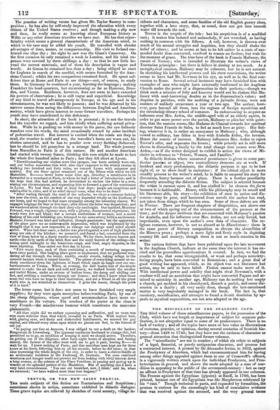TREVOR, OR THE NEW SAINT FRANCIS.
THE main subjects of this fiction are Tractarianism and Scepticism ; sometimes shown in action, sometimes exhibited in didactic dialogue. These grave topics are relieved by sketches of rural scenery, village in- cidents and characters, and some families of the old English gentry class, together with a love story, that, as usual, does not get into smooth water till towards the end.
Trevor is the sceptic of the tale : but his scepticism is of a modified cast ; it makes him isolated and melancholy, if not wretched, as having nothing in common with his fellows. A veil, however, is thrown over much of his mental struggles and inquiries, lest they should shake the belief of others ; and he seems at last to be left rather in a state of sus- pended doubt than converted, resolved to reason no further, but wait for the moment of grace. The true hero of the book is Francis Malinsey, the curate of Norton ; who is intended to illustrate the writer's views of Tractarian principles : but there is failure in aiming at too much. As a metaphysical creation, Malinsey may be coherent, but he is not natural. In sketching his intellectual powers and his stern convictions, the writer seems to have had Mr. Newman in his eye, as well as in the final con- version to Rome. Several actual instances may have furnished him with examples of men who might have externally conformed to the Anglican Church under the power of a dispensation in their pocketsi—though we think such a mixture of folly and knavery would not be shaken like Ma- linsey with soul-harrowing doubts as to the dispensation's value; and disputes in parishes, with the mobbing of a juvenile divine, were not matters of unlikely occurrence a year or two ago. The author, how- ever, goes beyond all these, into the regions of foreign mysticism and the circulating-library school of romance. In endeavouring to acquire an influence over Mrs. .Arden, the middle-aged wife of an elderly squire, in order to get more power over the parish, Malinsey so plies her with quiet- ism, that the matron seems, like Madame de Chantal towards her spiritual director Saint Francis de Sales, to feel as much love as piety. Her feel- ing, whatever it is, is rather an annoyance to Malinsey ; who, although vowed to celibacy, has fallen in love with Arabella Arden, the heroine. Hence the source of interest. Malinsey influences Mrs. Arden to reject Trevor's offer, and separates the lovers ; while priestly art is still more shown in disturbing a family by the total change that comes over Mrs. Arden,—as if the writer designed to exhibit in action the views of Mi- chelet in reference to "Priests, Women, and Families."
In didactic fictions where unnatural prominence is given to some par- ticular passion or object, two contradictory elements are at work. If incident and story predominate, the didactic purpose is apt to be lost sight of, or to show itself in caricature : if the ethical object is more steadily present to the writer's mind, he is liable to suspend his story for discourses, heavy because out of place. There is a further peculiarity frequently attending the didactic fiction. The subject is selected because the writer is earnest upon it, and has studied it : he chooses the form because it is fashionable. Hence, while his philosophy may be sound and his literature able, his story—his exhibition of men in action and dis- course—may be poor, and borrowed from novels the author has read, not taken from things which he has seen. Some of these defects are rife in Trevor. There are frequent chapters of disquisition, not above one or two of which spring out of the circumstances of the persons at the time ; and the deeper incidents that are connected with Malinsey's passion for Arabella, and his influence over Mrs. Arden, are not only forced, but improbable, even upon the author's own data of character. The re- ligious romance, however, is not so absurd as in Hanykstone : there is the same power of literary composition to elevate the absurdities of the Minerva press ; perhaps a more light and lively style in depicting country life and scenery, though there is not so much stamina in the writer.
The various fictions that have been published upon the late movement in the Anglican Church, indicate at the same time the interest it has ex- cited and the groundless apprehensions it created. In fact, we find the results to be, that some wrongminded, or weak and perhaps notoriety- loving people, have been converted to Romanism; and a great deal of good writing has appeared, which, as its object was not literature but action, may be said to have failed. Fiction cannot make more of it. With intellectual power and subtilty that might rival Newman's, with a resolute will and an asceticism that might have converted Pagans and at- tained to saintship in another age, Malinsey can do nothing but empty a church, get mobbed in his churchyard, disturb a parish, and cause dis- sension in a family ; all very easily done, though the last-mentioned matter is very improbably managed in the book. The fact is, that casuistry, mortification, and attempts to found a Jesuit dominion by ap- peals to mystical superstition, are not arts adapted to the age.


































 Previous page
Previous page